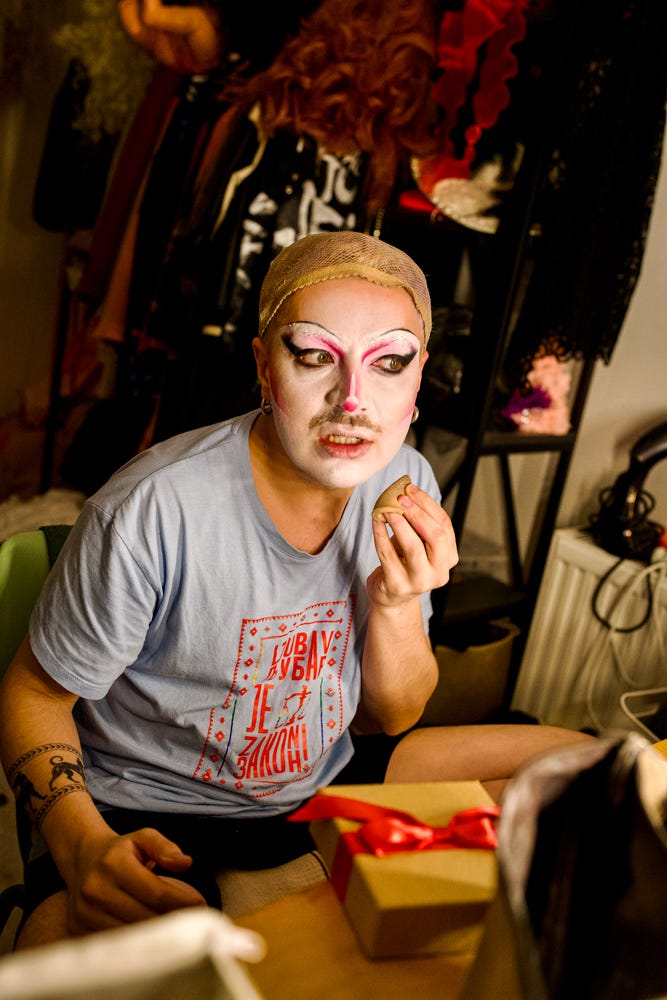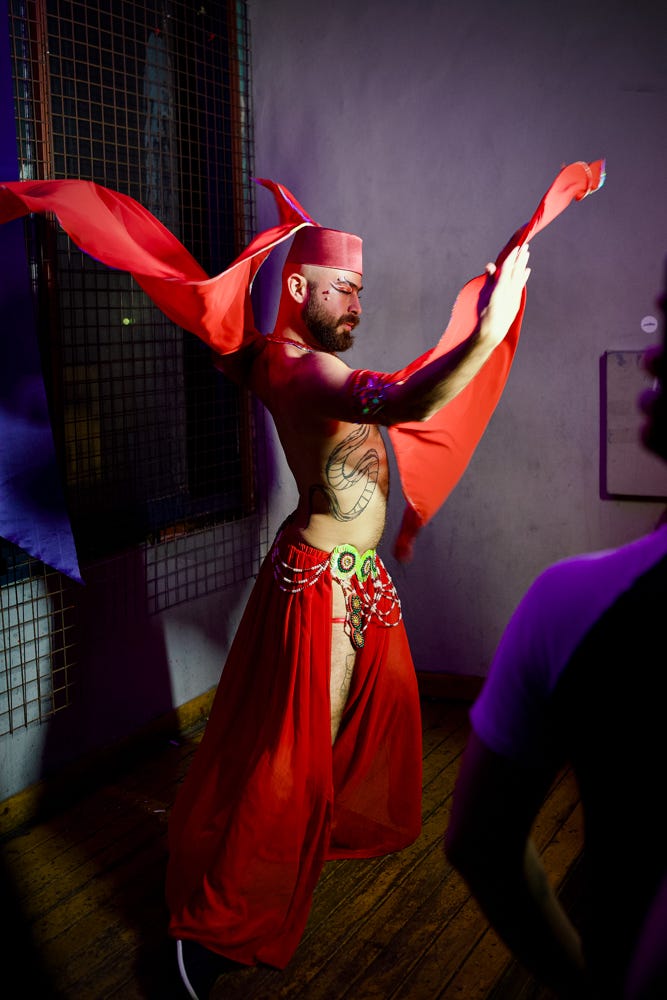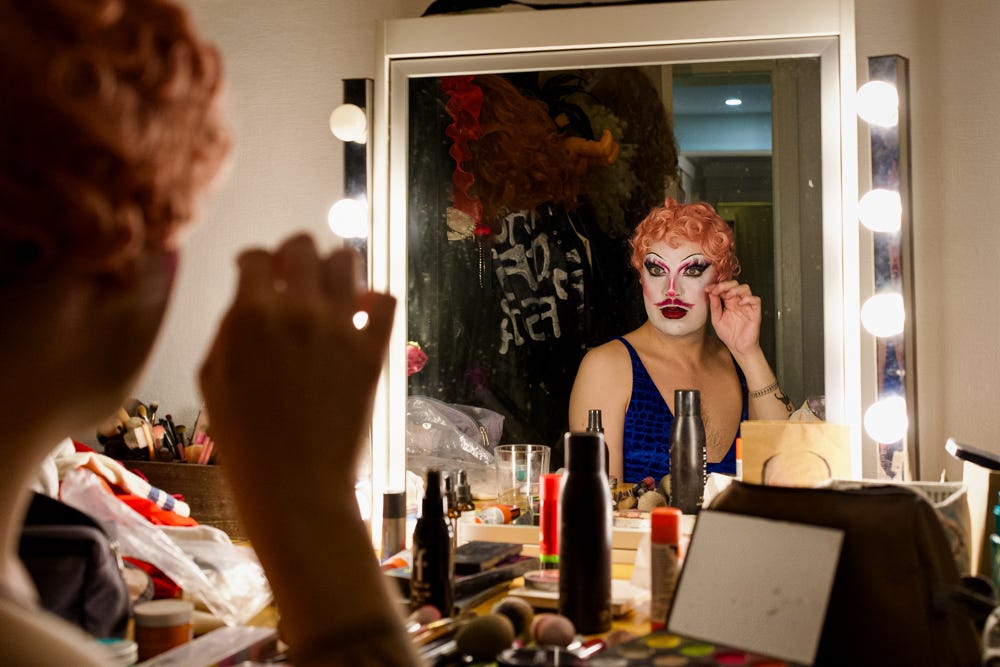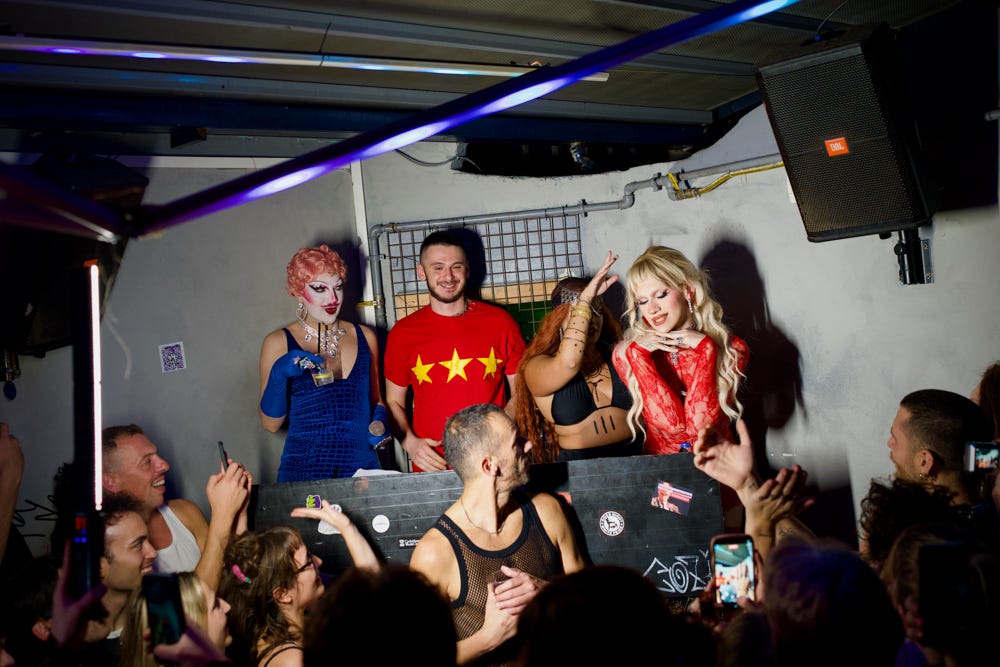ISTANBUL — When Florence Konstantina Delight talks about their childhood, the stories are primarily about bullying, abuse and hatred.
“My voice, appearance and sexuality didn’t fit with societal expectations,” Florence said.
Now, as an adult in their late-20s with a different name and gender than assigned at birth, Florence has found a way to make a living as a professional drag queen. The job involves challenging gender norms and stereotypes in a satirical, comical or theatrical way.
“I had to hide my emotions for so many years,” Florence told Turkey recap. “Drag helped me to regain power over them.”
Last Saturday, Florence sat at a dressing room table in their Istanbul home, outlining their mustache in a dark pink color. The choice of outfit and make-up are picked to reflect the mood of the drag persona that will take the stage later that night.
“Today’s emotion is rage,” Florence says. “So, my performance will be a bit more freaky.”
‘Rage’ because earlier last week news broke about an anti-LGBTQ draft law that would penalize expressions of queerness.
Proposed legislation in an upcoming judicial reform package is expected to introduce 1-3 year jail sentences for vague acts, such as promoting “behaviors contrary to biological sex” or “general morality”. It would also raise the minimum age to 25 for gender reassignment surgery and restrict access to medical support for the process.
The news has shaken Florence and members of the LGBTQ community across Turkey, where homosexuality is not illegal, but increasingly vilified.
According to recent assessments, the reported draft laws would move Turkey’s legal system closer to criminalizing the LGBTQ community, further stigmatizing and isolating individuals who already face challenges in accessing work opportunities and medical care.
“If this bill passes, my existence will be illegal,” Florence told Turkey recap.


‘Trying to remove us from the public sphere’
Yıldız Tar, the editor-in-chief of the pro-LGBTQ Kaos GL magazine, said that if enacted, the 11th Judicial Package would represent one of the most restrictive legal measures targeting queer individuals in Turkey in recent decades. He described the draft as “outrageous”.
“It threatens the very existence of LGBTQI individuals,” Tar said, adding the proposal is harsher than Russia’s anti-gay propaganda law.
“In Russia, it’s limited to public spaces, but the Turkish version also affects private spaces. The direct implication of this draft is that if you are LGBTQI, you can be imprisoned”.
Since 2015, the government has opened up a “war” against LGBTQ people, Tar told Turkey recap, stating the government’s goal is “to get rid” of queer people in public spaces.
“Our work has led to positive changes in the society, so the LGBTQI movement here in Turkey is liked by many people,” he said. “The government is trying to remove us from the public sphere, so we cannot influence the general society.”
Turkish Pres. Recep Tayyip Erdoğan has long accused queer people of “perversion” and of undermining “family values”, a rhetoric that has intensified since he declared 2025 the “Year of the Family.”
For Yıldız Tar, the proposed legislation represents the next logical step in that agenda.
“We hope the draft won’t reach the commission,” he said. “If it does, it could make it to parliament [for a vote].”
Club and job hopping
Back in Istanbul, Florence refuses to disappear. Last Saturday night, the drag queen walked down Nevizade street with a pink wig, high heels and tight-fitting blue dress that drew gazes from people sitting at restaurants in the narrow alley.
“Walking the streets in drag is not just about fun and nightlife,” Florence says, strutting confidently to a club in the central Beyoğlu district. “It’s a way to question the way things are.”
However, the drag queen is also affected by growing pressure on the community. A week earlier, a Kadıköy club where Florence performed for five years, was shut down. The official reason given was due to noise complaints.
“It’s a pretext,” Florence said, noting bars on the same street blast music until dawn. “The owner was given a week’s notice.”
Florence lost their income and health insurance overnight. And Istanbul lost another queer space.
‘Visibility itself is the protest’
Florence entered the club before showtime. By 2 am, the venue is packed. Bodies move to fast electronic beats. Sweat glistens under dim lights.
On the dance floor, men kiss, trans women laugh at the bar, queer and straight guests mingle.
Then, the lights turn on. Florence and the other performers step behind the DJ booth. Florence welcomes the crowd and introduces the artists. There are no speeches, no manifestos.
“Everything about me is political,” Florence said later. “When I’m on stage, my existence becomes visible and that visibility itself is the protest.”
The crowd roars during the performances. They cheer, whistle, clap and scream while the artists dance among them. The styles and performances are as different as the artists.
There is belly dancing to a Palestinian song. Then, Florence performs to a song by the queer icon Klaus Nomi, who toured with David Bowie and was one of the first prominent pop stars to die from AIDS.
About 30 minutes later, the show ends with a Syrian drag artist spinning in the style of a whirling dervish. He then grabs the microphone and speaks about the global rise of the far right, the disappearance of safe spaces and the need for solidarity.
The crowd cheers in agreement. Then, the DJ takes over again with electronic music.
“What I love about performing is that I am sharing the stage with my chosen family,” Florence said, adding in a country where queerness is perceived as a threat, community members provide protection.
The drag scene is about more than just performance or protest, it’s also about care, Florence concludes. It is a network that fills the gaps left by families, institutions and the state.
“We build our own support systems because no one else does,” Florence said. “They can close our venues, but they can’t close what we’ve built between us.”
Turkey recap is an independent, reader-supported newsletter that helps people make sense of the fast-paced Turkey news cycle. Contact us: info@turkeyrecap.com.
Subscribe here on Substack (or on Patreon for discount options). Paid subscribers get full access to our recaps, reports, members-only chat and news tracking tools.
We are an affiliate of the Global Forum for Media Development and aim to create balanced news that strengthens local media by supporting journalists in Turkey.
Diego Cupolo, Editor-in-chief
Emily Rice Johnson, Deputy editor
Ceren Bayar, Parliament correspondent
Yıldız Yazıcıoğlu, Parliament correspondent
Günsu Durak, Turkish language editor
Demet Şöhret, Social media and content manager



